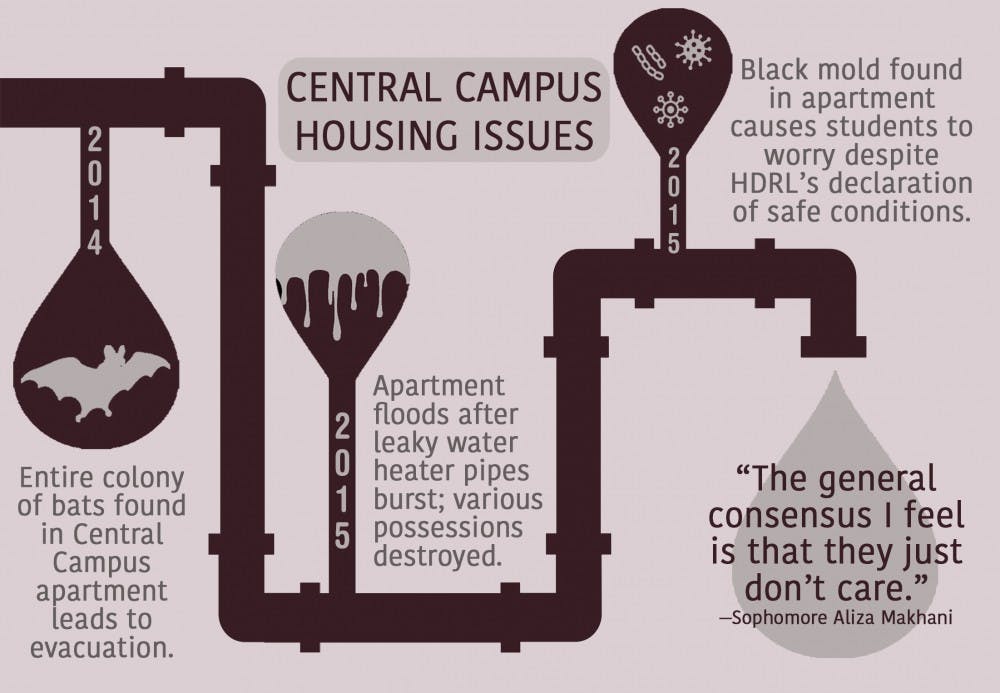Students on Central Campus have had to combat mold, flooding, bats and insects in recent months.
A number of health and safety incidents have raised concerns among some students living on Central Campus. In some instances, they have expressed dissatisfaction about the handling of the cases by the office of Housing, Dining and Residence Life, often due to communication issues or differences in opinion.
During the summer of 2014, junior Daniel Inmacolato discovered a bat in his apartment. A subsequent HDRL investigation found an entire colony of bats, leading to an evacuation. Over Fall Break this year, sophomore Aliza Makhani’s apartment was flooded after buildup from a water heater’s leaky pipes collapsed the apartment’s ceiling, destroying her roommate’s laptop, various electronics and other possessions.
“They’re being unresponsive and it’s really frustrating,” Makhani said, adding that HDRL has failed to respond to emails and has made it difficult to schedule an in-person appointment. “The general consensus, I feel, is that they just don’t care.”
In addition, students have raised the issue of black mold in Central Campus apartments on the Fix My Campus Facebook page. Sophomore Mackenzie Drazan reported finding black mold in her apartment during the first week of classes this year.
The University maintains that black mold does not pose a threat to students unless it is exposed on the surface.
“Mold is pretty much everywhere,” said Sue Wasiolek, associate vice president for student affairs. “As long as it’s not disturbed or external, any test for it would be negative.”
Air quality tests conducted by the HDRL Facilities Department as well as testing by the Occupational and Environmental Safety Office have very rarely returned with results indicating any danger from black mold.
“In almost every circumstance, between the inspection and the testing, we’ve come back with good results,” said Dean for Residential Life Joe Gonzalez. “So there really hasn’t been an air quality problem.”
Following instances in which tests have raised concerns—such as during a 2009 mold outbreak in Edens Quadrangle—students have been moved to other rooms while health and safety concerns were addressed.
Some students have questioned, however, the accuracy of the administration’s tests. An outside contractor Drazan hired found the presence of black mold along the walls of her apartment and in the air, but the subsequent HDRL investigation did not find any mold-related health concerns.
“The fact is mold is in all buildings, especially in the humid south,” Gonzalez wrote in an email to Drazan. “The only danger is when you disrupt the mold, which is what happened in this case.”
In response, junior George Mellgard, Duke Student Government vice president for residential life, is attempting to bridge this gap. Mellgard is looking to address these concerns by acting as a “facilitator” between students and the administration to “find the truth in the matter,” explaining that the lack of common ground in past years has led to persistent complaints.
“If we find consistent discrepancies between what students consider a mold problem and what HDRL considers a mold problem, at that point we can come to a resolution and move forward,” Mellgard said. “But until we know whether or not it’s a problem—which is hard because HDRL’s tests consistently say it isn’t—we cannot act.”
Gonzalez explained that the tests are performed on a case-by-case basis as there have been a low number of complaints relative to the number of students living on Central Campus. Mellgard attributed this partly to the lack of effort by affected students to reach out to HDRL outside of a few individual cases, adding that he is consolidating a list of students who have complained about mold to make sure they have reached out to HDRL.
Gonzalez said that HDRL has not heard any complaints about animals and insects this year. Makhani noted, however, that she has had issues with ants in her apartment this year and reported them to HDRL, but HDRL chose not to perform an extermination after investigating the room.
Gonzalez also addressed the colony of bats found in the Summer of 2014, noting that it is not unusual for bats to appear on Central Campus periodically, though that specific incident was especially rare.
“There’s a number of attractions close to Central or on Central itself. The gardens in particular are really popular for bats,” Gonzalez said. “So it’s not unusual for there to be a bat on Central, but it’s difficult for them to actually make a colony.”
Inmacolato is not convinced the University is dedicating enough resources to the health and safety issues students care about.
“I think Duke spends a lot of money on things like renovating the entrance to Perkins, and not enough on undergraduate students’ real needs, such as housing and increased variety in food options,” Inmacolato said.
Get The Chronicle straight to your inbox
Signup for our weekly newsletter. Cancel at any time.

